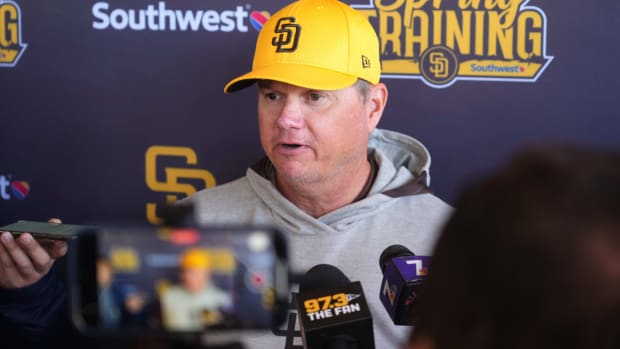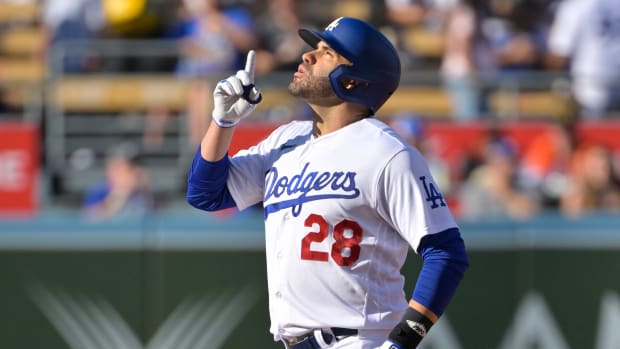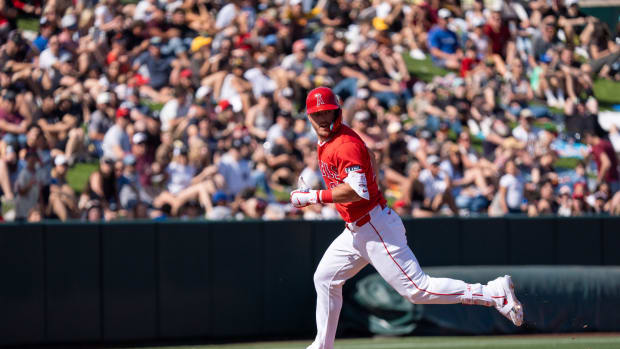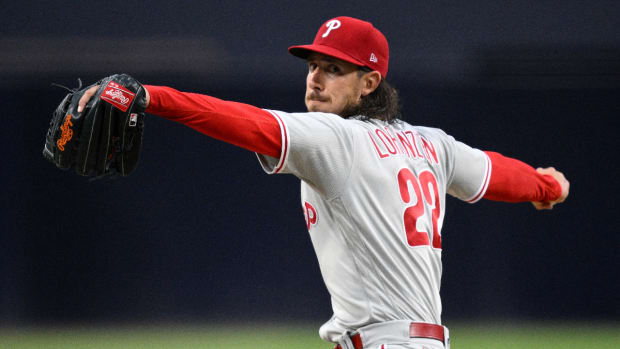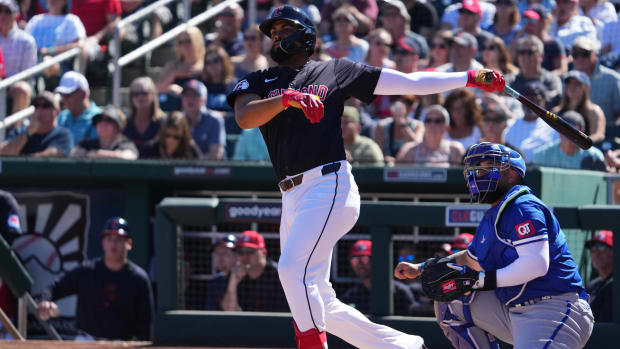Didi Gregorius keys Yankees' revival while upholding two baseball legacies
Get all of David Gardner's columns as soon as they’re published. Download the new Sports Illustrated app (iOS or Android) and personalize your experience by following your favorite teams and SI writers.
NEW YORK — For two summers in the mid-2000s, the three Didis took the field together. Johannes Gregorius Sr., the patriarch, was the ace. Approaching 40 years old, his fastball had tapered off, but his mind was more acute than ever and he used it to torment batters. His older son, Johannes Jr., pitched and plugged in gaps along the infield. And his younger son, Mariekson, caught and played shortstop. To their teammates on the Santa Maria Pirates—a semi-pro adult league team in Curacao that won consecutive championships in those two years, 2006 and '07—they were known simply as Didi Sr., Didi Jr. and Didi Little.
No one can recall now the origin of the nickname—Johannes Sr. says he was just “born with it”—but its reach has now carried far beyond that tiny Caribbean island and been spoken by fans, broadcasters and teammates across three continents and in at least five languages. And as long as a love for America’s pastime persists, it will be the answer to a trivia question: Who followed Derek Jeter at shortstop for the Yankees?
Last season, Mariekson “Didi” Gregorius became the first man other than Jeter to be the regular shortstop in the Bronx since 1995. After an uninspiring start to the year, he went on to become one of New York's best hitters in the second half of the season, batting .294 average after the All-Star break and finishing the season with an overall slash line of .265/.318/.370. Though modest, that was an improvement over the .256/.304/.313 line Jeter produced in the last season of his Hall of Fame career in 2014. Gregorius's strong play helped the Yankees make it back to the postseason for the first time since 2012, though they lost to the Astros in the AL wild-card game.
After a similarly sluggish start this year, Gregorius has again been one of New York’s sparkplugs as it has turned its season around in the past two weeks—hitting .348 since May 10, the highest on the team, to go with a .375 on-base percentage and his typically excellent defense. All of that has helped the Yankees crawl back from a 9-17 start to reach .500 at 22-22.
Last season Gregorius spent almost as much time fielding questions about the departed Captain as he did fielding ground balls. This year, though, he’s being measured only against his own potential. As the youngest member of Curacao’s first family of baseball, Gregorius had been accustomed to succeeding as a successor. His lifelong journey had been in making a borrowed name his own. And that same path that prepared him to inherit a position from an icon hasn’t changed even as the challenges surrounding him have. “I’ve never tried to play like anyone else,” he says. “I’m just trying to play my game. I’m trying to be the best Didi I can be.”
*****
Gregorius wasn’t pushed into baseball, but he was surrounded by it from birth. His paternal grandfather, Antonio, is a renowned Curacaoan pitcher who appeared in four games for the Netherlands Antilles national team in the 1955 Pan American Games. (Standing 6’7”, he also has a nickname: “Chiquitin.” Translation: “Tiny.”) His father played professionally for the Amsterdam Pirates starting in 1984 and bounced around semi-pro leagues in the Netherlands and Curacao for more than two decades while also working as a carpenter. Eventually, he earned a spot on the Dutch Antilles team in the 2008 Americas Baseball Cup. Johannes Jr. was also on that team and spent several years playing for a pro club in Italy. And the boys' mother, Sherista Stroop, played for the Dutch national softball team.
“Didi got baseball the same way I did,” Johannes Sr. says. “We didn’t have to make him play. I saw my father play baseball for so long that I started to play. It was the same with my boys.”
Didi was born in Amsterdam in 1990 and played T-ball there before moving to Curacao at age five, as his family followed Johannes Sr.’s baseball career. Although he got his work ethic from his father—who would run sprints between innings and pitch on back-to-back days—he idolized his older brother. Johannes Jr. has eight years on the 26-year-old Didi, and though he never made it into the American farm system, his influence on his younger brother is clear. “I didn’t teach him anything, really,” Johannes Sr. says. “His older brother taught him everything he knows.”
The 30: Stats don't lie in this week's MLB Power Rankings
What his brother taught him went well beyond baseball. From Johannes Jr., Didi drew the inspiration to draw. They watched Dragon Ball-Z and X-Men cartoons on weekend mornings and started sketching what they saw. Johannes Jr., who now works in airport security in Curacao, took classes, but Didi never did; instead, he held competitions with five or so of his friends in elementary school. They wanted to see who could make the most lifelike portraits and, Didi says, “I won a lot. A lot. A lot. A lot.” To this day, whenever Johannes Jr. learns a new skill, Didi does too. They’ve become photographers and videographers and recently began dabbling in Adobe After Effects—motion graphics—together.
As a player, Johannes Jr. says he knew Didi had pro potential by the time his little brother was seven years old. He would watch him at Marchena Little League field, a rocky patch of grass and dirt with a beautiful mountainous backdrop in Tera Kora, and be mesmerized by his brother’s quick release and advanced understanding of the game. When Didi moved to second base around that age, Andrelton Simmons played shortstop next to him. The future two-time Gold Glove Award winner and the future New York Yankee turned double plays that stifled opponents and astounded onlookers. “What they were doing at that age,” Johannes Jr. says, “you just never see anything like it.”
Scouts started showing up to see him play by age 12, Didi remembers. He first drew interest from an MLB team at 15 (he wouldn't specify which one), but he didn’t want to consider signing unless the team would let him finish high school and then move him to the United States. He eventually signed with the Reds at age 17 in the summer of 2007. Cincinnati scout Jim Stoeckel asked him if he wanted to pitch, but Didi said he wanted to carve a path apart from that of his father and brother. He had only begun to play shortstop that year, but he insisted that he stay there, and that was the position he played exclusively when he started his professional career the following season.
After reaching Double A with the Carolina Mudcats in 2011, Gregorius spent part of that off-season helping the Dutch national team win the Baseball World Cup. A couple weeks later, back in Curacao, he and his island teammates were called to a state building where they discovered they were going to be knighted. The ceremony was short and it didn’t involve any swords, but Gregorius left it with a medal, a certificate and the permission to refer to himself as “Sir Didi." He doesn’t ask his teammates to call him that, he jokes, but he does use the honorific title in all of his social media handles.
He made his major league debut with the Reds on Sept. 1, 2012, recording six hits in 20 at-bats across eight games. But that December, he was traded to the Diamondbacks as part of a memorable three-team trade with Cleveland that also included such notable names as Shin-Soo Choo going to Cincinnati and Trevor Bauer to Arizona. “When I saw him he reminded me of a young Derek Jeter,” then-Diamondbacks GM Kevin Towers told reporters at the time. “I was fortunate enough to see Jeter when he was in high school in Michigan and [Didi has] got that type of range. He’s got speed. He’s more of a line drive-type hitter, but I think he’s got the type of approach at the plate where I think there’s going to be power there as well.”
• Subscribe to get the best of Sports Illustrated delivered right to your inbox
In his first at-bat as a Diamondback, on April 18, 2013, Gregorius hit a home run in Yankees Stadium. Two years later—without ever having played a full season in the majors—he would be calling that ballpark home. After the 2014 season, he was part of another three-team trade, this one also including the Tigers, the biggest result of which was that New York had a new shortstop. At the time, Gregorius told reporters that he wanted to be like Jeter, but he didn’t want to be Jeter. In the first two months of the season, Gregorius was neither: He batted .222 and committed six errors. He started getting advice from everywhere. Simmons, then with the Braves and now with the Angels, told him to rely on his understanding of the game. His dad told him to relax and “just be Didi.” Even Jeter called him and told him not to worry about other people’s perceptions.
But the message that meant the most came from Johannes Jr. He seldom offered his little brother baseball advice anymore, but he broke his silence with a five-paragraph email on May 9. The message began in Papamientu (Curacao’s most common language) before switching to English. It outlined fixes for everything from Didi’s stance to his mentality against lefties. Johannes Jr. ended the email with his signature achievement—“the [man] with the 20-game hitting streak on the island has spoken. Love you bro.”
“He’s always been there for me, helping me through tough times,” Didi says now. “That’s why he’s the big brother, he’s always there.”
*****
At spring training in Tampa this year, Didi took on a big project. The Yankees’ chief photographer, Ariele Hecht, had seen his art and his pictures on Instagram (his handle is @sirdidig18) and offered him a photo spread in the Yankees’ official magazine. “He had a creative eye,” Hecht says. “Everyone can use a filter on Instagram. His was about more than that—it was about the actual shots.”
So Gregorius spent his time in Florida not only improving his fielding and his power, but also snapping photos of sunsets and his teammates in candid moments. The result was an eight-page spread with a blend of baseball and nature that reflected the man behind the lens. “When you play next to someone, you get to know them quite a bit,” says New York third basemen Chase Headley. “And Didi is—what’s the right word?—eclectic. His interests don’t begin and end with baseball, and that’s a good thing.”
As with every educated person from Curacao, Gregorius speaks four languages—Papamientu, English, Spanish and Dutch—and he switches seamlessly between them. On the field, he’ll call to second basemen Starlin Castro in Spanish and then to Headley in English. He’ll return to the locker room to text family and friends in Papamientu and Dutch and then give interviews in English and Spanish. “I like being able to respond to people however they communicate to me,” he says.
These days the questions about Jeter rarely emerge. When legends are replaced, the transition is rarely so smooth, but Gregorius's path had prepared him for it. He knows he will never be the Yankees’ most famous shortstop, but that doesn’t bother him. After all, in Curacaos, he’s still trying to become the most famous Didi Gregorius.































